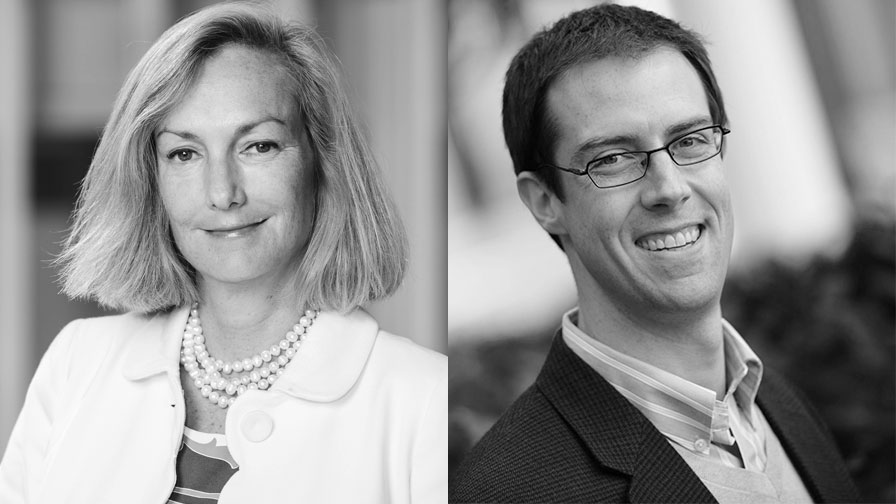
Leadership Unscripted: The Private Sector and the Public Good
By Jen A. Miller
How can the private sector and global institutions such as the World Bank work together to solve intractable global issues?
DJ Nordquist, former executive director for the United States at the World Bank Group and former chief of staff at the White House Council of Economic Advisers, discussed the topic with University of Virginia Darden School of Business Professor Dan Murphy at the latest Leadership Unscripted event. In a wide-ranging conversation, they explored the role of the World Bank, and how the government can work with the private sector to produce positive change — and what happens when they don’t. The event, held at UVA Darden DC Metro, welcomed guests both in person and via livestream.
Murphy started the conversation by asking Nordquist about her time at the World Bank. The mission of the bank, which was founded in 1944 to rebuild Europe after World War II, has changed over time, she said. The bank’s first project was a 1947 reconstruction loan to France that came with the stipulation that they purge the French government of the Communist Party. “I can’t imagine that Bank would do that today because the bank is supposed to be apolitical,” she said.
The official mission of the group, which now has 189 member countries, is to end extreme poverty and promote shared prosperity. But Nordquist, who also serves as a Darden Dean’s DC Fellow, believes it “has lost a little bit of its focus on eradicating extreme poverty.”
LISTEN TO THE FULL EVENT
She cited the International Finance Corporation (IFC), which is part of the World Bank, giving long-term financing to Shangri-La Resort Asia Limited to support luxury hotels in the Maldives. The country, which is made up of 1,192 islands, is trying to relocate people from those areas most susceptible to rising oceans. But the IFC project is pushing tourism to those same locations. “A hotel chain out of Hong Kong that is fairly liquid didn’t need [help],” she said. “At what point … are we going to stop and say this is not [viable]?”

Sailors aboard the USS Spruance as the ship pulls in to Hambantota Navy Base, Sri Lanka, April 18, 2019. (U.S. Navy photo by Mass Communication Specialist 1st Class Ryan D. McLearnon)
Murphy then turned to China, a member of the World Bank and still labeled as an “upper middle-income country” despite being one of the world’s largest economies. That allows the nation to secure low interest loans — and then loan that money out at a higher rate. When a borrower defaults on a loan from China, the country can use the leverage to achieve a geo-political objective, Nordquist said, pointing to Hambantota International Port in Sri Lanka, which China financed and then took when the country defaulted on the loan.
The conversation turned back to the United States and the role of government in the economy, in particular new $1 trillion Infrastructure Investment and Jobs Act. Murphy, who has written extensively about the impact of fiscal stimulus, likened the challenge of dispersing that much money to planning a big family vacation.
“We’re not going to love everything but we’re willing to give up a little bit to have a family unit,” he said. Even if his brother offers to cook one night and burns dinner, it’s part of the experience. “It’s fair to think about government and policy in the same way. I may not get the exact roads I want and I’m not going to get the exact policy I want,” but overall we are better off with the roads than without them, he said.
They then spoke about declining faith in government institutions. In 2005, Nordquist worked on Hurricane Katrina recovery, “an example of major failures at state, local and federal levels. It took 50 years to build up all the problems in New Orleans,” she added. “That flood was a man-made disaster.”
Katrina overwhelmed the city in part because funding to maintain infrastructure like levees and sewer systems was spent on other things. In addition, the National Federal Flood Insurance program insured houses that private companies would no longer cover, allowing life to continue as normal in flood-prone areas — an issue that’s ongoing.
When it comes to climate change, Nordquist emphasized innovative solutions rather than trying to police high-polluting countries. In the U.S., that’s coming from both the private sector and government-sponsored research and development, including funding from the infrastructure bill.
The University of Virginia Darden School of Business prepares responsible global leaders through unparalleled transformational learning experiences. Darden’s graduate degree programs (MBA, MSBA and Ph.D.) and Executive Education & Lifelong Learning programs offered by the Darden School Foundation set the stage for a lifetime of career advancement and impact. Darden’s top-ranked faculty, renowned for teaching excellence, inspires and shapes modern business leadership worldwide through research, thought leadership and business publishing. Darden has Grounds in Charlottesville, Virginia, and the Washington, D.C., area and a global community that includes 18,000 alumni in 90 countries. Darden was established in 1955 at the University of Virginia, a top public university founded by Thomas Jefferson in 1819 in Charlottesville, Virginia.
Press Contact
Molly Mitchell
Senior Associate Director, Editorial and Media Relations
Darden School of Business
University of Virginia
MitchellM@darden.virginia.edu








